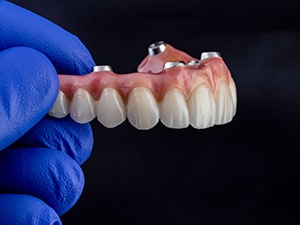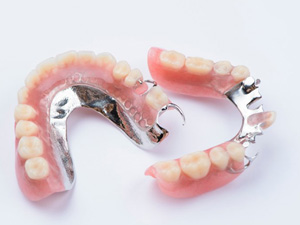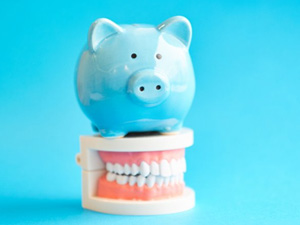Dentures & Partials – Denton, TX
Regain a Complete, Confident Smile in No Time
Are you missing most or all your natural teeth? If so, we don’t need to tell you that tooth loss can take a significant toll on your quality of life. It can make everyday tasks you once took for granted a challenge, such as eating comfortably, speaking clearly, and feeling good about your appearance. Thankfully, you don’t have to let tooth loss hold you back in life! At Aguilar Family Dentistry, we can help you regain a complete, confident smile in no time with full and partial dentures in Denton. Read on to learn more about this reliable restoration and give us a call when you’re ready to put tooth loss behind you.
Why Choose Aguilar Family Dentistry For Dentures?
- #1 High-Quality Materials for Beautiful, Durable Results
- #2 Compassionate & Talented Dentist with Years of Experience
- #3 Multiple Ways to Make Dentures Affordable
Who's a Good Candidate for Dentures?

Roughly 178 million Americans have missing teeth, and many of them use dentures in order to eat, speak, and smile on a day-to-day basis. But how will you know if dentures are the right choice for you? The answer is simple: schedule a consultation with our team at Aguilar Family Dentistry. We know how to recognize the signs that indicate that a patient is a good candidate for dentures, and you can always count on us to point you toward the tooth replacement option that best suits your needs.
Effects of Missing Teeth

There are plenty of circumstances where you may end up losing teeth, such as tooth decay that has gone untreated for too long, an advanced form of gum disease, and facial injury. Some cases of tooth loss are more extensive than others, but regardless of how many teeth are missing, you’re likely to find that an incomplete smile can affect your life in a variety of ways. As just a few examples:
- You might not be able to enjoy all of your favorite foods anymore due to having increased difficulty chewing.
- Your ability to speak clearly may be compromised.
- You may start to feel self-conscious due to the very noticeable gap in your smile.
Instead of forcing yourself to live with the consequences of missing teeth, you should get in touch with our dental team so that we can give you our recommendation for filling in the empty space in your mouth.
What Qualifies You for Dentures?

The good news is that plenty of adults with missing teeth qualify for dentures. They could be the right choice for you as well if you meet the following criteria:
- You have lost many of your teeth or all of the teeth in your upper or lower jaw.
- Your gums are in good health overall.
- Your jawbone is strong enough to support dentures.
- You are willing and able to commit to practicing good oral hygiene after receiving your dentures.
In addition to figuring out whether dentures are a good fit for you, we will also need to determine which type of denture is the best choice for your situation. You can either get partial dentures or full dentures depending on the number of teeth that need to be replaced; additionally, you may be able to have your dentures attached to dental implants so that they don’t slip at awkward moments.
Alternative Tooth-Replacement Options

Even if you’re unable to get dentures, you may still benefit from other tooth-replacement methods:
- Dental Bridges: When only one or a few teeth are missing, the gap can be filled with bridge that uses two of your natural teeth to stay anchored in place.
- Dental Implants: Dental implants offer many unique benefits due to their ability to mimic the roots of your natural teeth. We can refer our patients to a local specialist to have dental implants placed.
Types of Dentures

With the help of modern dental technology and high-quality dental materials, dentures are now more natural-looking and comfortable than ever before! Each denture is custom-made to ensure you receive the best possible results. Depending on your unique preferences and needs, we will recommend one of these three types of dentures:

Partial Dentures
Partials are used to replace several missing teeth around the mouth. Like a puzzle piece, a partial denture fits around and between your remaining healthy teeth to seamlessly fill in the gaps in your smile. Small, discreet metal clasps wrap around your natural tooth structure to hold the partial in place.

Full Dentures
Full dentures feature an entire arch of custom-made replacement teeth set into an acrylic, gum-colored base. The base is precisely crafted to fit snugly on top of your gums, which creates a strong natural suction that holds your new smile in place. Denture adhesive can also be used to provide extra support for your dentures.

Implant Dentures
Implant dentures combine the traditional dentures listed above with state-of-the-art dental implants. We can use anywhere from four to eight of these small titanium posts to mimic the roots of your missing teeth and securely anchor your denture in place. This unique placement allows you to enjoy optimal stability, comfort, aesthetics, and longevity.
The Benefits of Dentures

Simply put, life gets tricky when you don’t have all your teeth. Unseemly gaps will ruin your smile, and the lack of pearly whites can challenge everyday tasks. The fortunate thing, though, is that you don’t have to bear such effects. Dentures are a restorative treatment that relieves your tooth loss and improves your way of living. In fact, they provide a whole host of perks that justify their price. As proof, consider the benefits of dentures listed below. Do feel free to call our office for details, though.
Psychological Benefits?

Mentally speaking, people often struggle to cope with tooth loss. After all, going without a full smile can make you feel anxious and insecure. From there, it’s quite easy to withdraw from your community and experience sadness or depression.
Given these realities, dentures are a valuable booster to your mental health. Since they give you a whole new grin, they improve patients’ confidence and body image. Consequently, you’ll feel more at ease regarding looks, speech, and chewing ability in social situations.
Clearer Enunciation

As you’ve likely experienced, missing teeth means having a rough time with speech. Your lips and tongue need pearly whites to position themselves well. Without them, some words are difficult or nearly impossible to pronounce correctly.
Thankfully, the artificial teeth in dentures act as tooth substitutes. In other words, they help to position your tongue and lips. All you need to do is briefly adjust and get used to their presence. Once you’ve practiced enough, the prosthetics will let you speak as clearly as ever before.
Improves Nutrition

Of course, it isn’t just speaking; loss of teeth also makes eating rough. Fewer chompers mean a weaker bite force, making food hard to chew. Many healthy items have tough textures, too – veggies and fruits, steak, etc. If chewing them gets so bothersome that you stop eating such things, you’ll likely suffer malnutrition or indigestion.
That said, dentures give you new teeth that allow for better chewing. They thus expand your potential diet to include a wide range of healthy foods. If you take advantage of that fact, you’ll see your physical health improve alongside your nutrition.
Preserves Oral Health

Left unchecked, lacking teeth will harm your oral health. The resulting smile gaps, for instance, will provide harmful bacteria with ideal breeding grounds. Furthermore, they’ll tilt your surviving teeth until the latter ones also fall out.
Of course, dentures keep these issues at bay by “filling in” your smile. Without smile gaps, the harmful bacteria will have fewer places to thrive. Similarly, the restoration will prevent your natural teeth from tilting and keep them straight and narrow.
Expands Opportunities

When it comes to first impressions, your smile is crucial. Studies show that people pay more attention to it than anything else in an initial meeting. As such, you’ll want your grin to look healthy and full, so you’ll have a better time with friends, family, and coworkers.
Naturally, dentures’ restorative effects expand many of your social opportunities. The prosthetics give you a whole smile to flash, prompting peers to think and feel better about you. Down the line, those improved sentiments could lead to amazing friendships, romance, and job prospects.
Dentures Aftercare

Your new teeth can significantly improve your daily quality of life by restoring your smile’s appearance and functionality. However, even if you have no natural teeth remaining, you must care for your prosthetics properly to avoid potential oral issues, like gum disease or other more serious concerns.
Continue reading to learn more about how you can maintain your dentures to preserve your dental health, and please don’t hesitate to contact us if you have additional questions.
Remove After Eating

Your dentures restore some of your original bite force so that you can enjoy a wider variety of wholesome foods that support your oral and overall health. However, they can trap little bits of food that attract harmful bacteria. This can eventually result in plaque formation that contributes to the development of gum disease.
You can prevent this by rinsing your dentures with gently running water after meals. Remember not to use hot water, though, because it might warp the base so it no longer fits correctly.
Clean Your Restoration
The materials your prosthetics are made from don’t develop decay themselves, but germs in your mouth might still penetrate your connective tissues or jawbone and cause problems. Thankfully, this can be avoided by implementing a consistent at-home dental hygiene routine that includes your dentures.
For instance, it’s recommended that you remove them morning and night to gently scrub all their surfaces with a soft-bristled toothbrush and clear dish soap (or special denture paste) that won’t abrade the materials. Then, be sure to rinse them before reinserting them or leaving them in a glass to soak.
Keep Your Dentures Safe
The acrylic base of your new teeth can become quite slippery during cleanings, and can be cracked, damaged, or broken if it’s dropped. Placing a soft towel beneath you when you wash them can cushion their landing to prevent potential harm.
Also, when you remove your dentures at night, you may want to ensure you store them out of the reach of small pets or children who might not handle them very carefully.
Remove Dentures When You Sleep
You might feel tempted to sleep in your dentures, but this isn’t usually recommended. They rely on a firm suction with your gums to remain in place all day, reducing the circulation to your connective tissues. This can result in blisters or gum disease, making it uncomfortable to wear your restoration.
Taking it out and placing it in a glass of water or a denture soaking solution overnight helps remove germs while giving your mouth a well-earned period of rest and recovery.
Notice Changes
Paying attention to what’s happening in your mouth can help you identify changes that can point to an underlying concern that requires attention. For instance, if your gums look darker or more swollen than usual, you might have developed early gum disease and should contact our team for an appointment.
If you see chips, cracks, or other damage to your dentures, please contact us for an appointment rather than try to repair them yourself. Many patients have accidentally made matters worse using super glue or other household supplies, which aren’t usually intended for oral use and may be toxic if ingested.
Implant Dentures

Your implant dentures are not intended to be taken out and reinserted, like the traditional type. However, you must clean them carefully to avoid dental concerns, like peri-implantitis, the leading cause of implant failure.
Understanding the Cost of Dentures

It’s important to replace your missing teeth, but we understand that it’s also important to stay within your budget. Since there are many factors that can affect the cost of dentures in Denton, it’s difficult to provide a precise estimate until after we’ve met with you for a consultation. However, we do accept many dental insurance plans and can offer CareCredit financing, so rest assured – there are ways you can save money on quality dental care here at Aguilar Family Dentistry!
Factors that Affect the Cost of Dentures

Of course, your dentures will be their own expense, but there are other factors that can affect your overall treatment costs. For example:
- Preliminary treatments like gum disease therapy or tooth extraction will add to your expenses.
- The more missing teeth you need to have replaced, the higher the price.
- Different types of dentures have different costs associated with them – partials are generally less expensive than full dentures, which are usually less expensive than implant dentures.
Are Implant Dentures More Expensive?

Implant dentures tend to cost more than traditional dentures – at least upfront. However, implant dentures also last a lot longer on average. With good care, they can even go for 30 years or more without needing repairs or adjustments! In that sense, implant dentures might save you money in the long run.
Rest assured, both restorations are reliable tooth replacements. At the end of the day, you can’t go wrong, but it is worth considering how the longevity of an implant denture could impact your budget.
Does Dental Insurance Cover Dentures?

Yes – depending on the type of denture you choose and the extent of your tooth loss, your dental insurance benefits could cover between 50% to 80% of your costs. We accept many different dental insurance plans at Aguilar Family Dentistry and can help you get the most out of your coverage. Simply let us review your specific policy and let us know if you have any questions or concerns!
Other Options for Making Dentures Affordable

If you don’t have dental insurance, don’t worry – we can still help you make dentures in Denton more affordable. We’re proudly partnered with CareCredit, a third-party financier with a reliable reputation. After you qualify for CareCredit, you’ll have access to several monthly payment plans at little-to-no interest. Spread your treatment costs out over multiple paychecks and enjoy the peace of mind CareCredit can offer!
Denture FAQs

Dentures are an excellent option for patients who are missing several, most of, or all of their teeth. However, you may still have some unanswered questions when it comes to this restoration. Here are the answers to some of the most common questions we are asked about dentures. If you don’t see the information that you’re looking for below, just give us a call! We’d be happy to answer your inquiries and set you up for a consultation with us.
Can I Sleep with My Dentures?
Dentists usually recommend that you take out your dentures before you go to bed. When you first get your dentures, you’ll typically be told to keep them in your mouth for 24 hours, including when you sleep. After this, you should be taking them out every evening. Wearing dentures restricts the circulation in your gums, leading to soft tissue irritation and potentially speeding up ridge resorption. When you take them out, this will give the gums a chance to recover and get the nutrients they need at night. The dark space underneath dentures is also an ideal place for bacteria to thrive. Because of this, sleeping with dentures has been found to be associated with a higher risk of pneumonia.
Will It Hurt to Get Dentures?
If you have to have teeth extracted before you get your dentures, you are likely to experience some discomfort after the oral surgery. Be sure that you take all prescribed and over-the-counter pain medication as directed. The discomfort should improve in about 3 to 5 days. When you first receive your new dentures, you may encounter some minor irritation as your mouth adjusts to the appliance. The amount of time that the discomfort lasts varies from person to person. If you switch to a new set of dentures, the adjustment process may take longer than before. If pain persists, give us a call. This way, we can see if there are any underlying issues and come up with a solution.
Is It Hard to Talk with Dentures?
When you first get your dentures, it will take some time to get used to speaking with them. The exact amount of time it takes to adjust varies from person to person, but the more you practice, the quicker the process will go. You may find that you have a lisp with the dentures at first due to the changes in your palate, but once you learn to correct this, the lisp will go away. To practice speaking, read out loud to yourself and repeat the words that you find difficult to pronounce. Try to speak slowly at first, as fast speech can come out muffled. Ultimately, with a bit of practice, speaking will come naturally!
Will Dentures Change the Shape of My Face?
When you lose teeth, your facial muscles will eventually begin to sag. This can give your face a sunken appearance. Dentures will provide support to the facial muscles that have collapsed and ultimately improve your appearance. However, ill-fitting dentures might not give your facial muscles the proper support, so it’s important that each restoration is designed to fit perfectly in your mouth. If you notice that your denture isn’t fitting properly, you should have it either resized or replaced.
